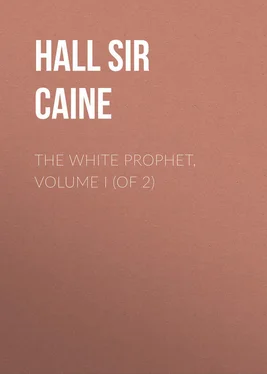Hall Caine - The White Prophet, Volume I (of 2)
Здесь есть возможность читать онлайн «Hall Caine - The White Prophet, Volume I (of 2)» — ознакомительный отрывок электронной книги совершенно бесплатно, а после прочтения отрывка купить полную версию. В некоторых случаях можно слушать аудио, скачать через торрент в формате fb2 и присутствует краткое содержание. Жанр: foreign_antique, foreign_prose, на английском языке. Описание произведения, (предисловие) а так же отзывы посетителей доступны на портале библиотеки ЛибКат.
- Название:The White Prophet, Volume I (of 2)
- Автор:
- Жанр:
- Год:неизвестен
- ISBN:нет данных
- Рейтинг книги:5 / 5. Голосов: 1
-
Избранное:Добавить в избранное
- Отзывы:
-
Ваша оценка:
- 100
- 1
- 2
- 3
- 4
- 5
The White Prophet, Volume I (of 2): краткое содержание, описание и аннотация
Предлагаем к чтению аннотацию, описание, краткое содержание или предисловие (зависит от того, что написал сам автор книги «The White Prophet, Volume I (of 2)»). Если вы не нашли необходимую информацию о книге — напишите в комментариях, мы постараемся отыскать её.
The White Prophet, Volume I (of 2) — читать онлайн ознакомительный отрывок
Ниже представлен текст книги, разбитый по страницам. Система сохранения места последней прочитанной страницы, позволяет с удобством читать онлайн бесплатно книгу «The White Prophet, Volume I (of 2)», без необходимости каждый раз заново искать на чём Вы остановились. Поставьте закладку, и сможете в любой момент перейти на страницу, на которой закончили чтение.
Интервал:
Закладка:
Gordon leapt up the steps and into the house as one who was at home, and going first into the shaded drawing-room he found his mother on the couch looking to the sunset and the Nile – a sweet old lady in the twilight of life, with white hair, a thin face almost as white, and the pale smile of a patient soul who had suffered pain. With her, attending upon her, and at that moment handing a cup of chicken broth to her, was a stout Egyptian woman with a good homely countenance – Gordon's old nurse, Fatimah.
His mother turned at the sound of his voice, roused herself on the couch, and with that startled cry of joy which has only one note in all nature, that of a mother meeting her beloved son, she cried, "Gordon! Gordon!" and clasped her delicate hands about his neck. Before he could prevent it, his foster-mother, too, muttering in Eastern manner, "O my eye! O my soul!" had snatched one of his hands and was smothering it with kisses.
"And how is Helena?" his mother asked, in her low, sweet voice.
"Beautiful!" said Gordon.
"She couldn't help being that. But why doesn't she come to see me?"
"I think she's anxious about her father's health, and is afraid to leave him," said Gordon; and then Fatimah, with blushes showing through her Arab skin, said —
"Take care! a house may hold a hundred men, but the heart of a woman has only room for one of them."
"Ah, but Helena's heart is as wide as a well, mammy," said Gordon; whereupon Fatimah said —
"That's the way, you see! When a young man is in love there are only two sort of girls in the world – ordinary girls and his girl."
At that moment, while the women laughed, Gordon heard his father's deep voice in the hall saying, "Bid good-bye to my wife before you go, Reg," and then the Consul-General, with "Here's Gordon also," came into the drawing-room, followed by Sir Reginald Mannering, Sirdar of the Egyptian army and Governor of the Soudan, who said —
"Splendid, my boy! Not forgotten your first fight, I see! Heavens, I felt as if I was back at Omdurman and wanted to get at the demons again."
"Gordon," said the Consul-General, "see His Excellency to the door and come to me in the library;" and when the Sirdar was going out at the porch he whispered —
"Go easy with the Governor, my boy. Don't let anything cross him. Wonderful man, but I see a difference since I was down last year. Bye-bye!"
Gordon found his father writing a letter, with his kawas Ibrahim, in green caftan and red waistband, waiting by the side of the desk, in the library, a plain room, formal as an office, being walled with bookcases full of Blue Books, and relieved by two pictures only – a portrait of his mother when she was younger than he could remember to have seen her, and one of himself when he was a child and wore an Arab fez and slippers.
"The General – the Citadel," said the Consul-General, giving his letter to Ibrahim; and as soon as the valet was gone he wheeled his chair round to Gordon and began —
"I've been writing to your General for his formal consent, having something I wish you to do for me."
"With pleasure, sir," said Gordon.
"You know all about the riots at Alexandria?"
"Only what I've learned from the London papers, sir.
"Well, for some time past the people there have been showing signs of effervescence. First, strikes of cabmen, carters, God knows what – all concealing political issues. Then, open disorder. Europeans hustled and spat upon in the streets. A sheikh crying aloud in the public thoroughfares, 'O Moslems, come and help me to drive out the Christians.' Then a Greek merchant warned to take care, as the Arabs were going to kill the Christians that day or the day following. Then low-class Moslems shouting in the square of Mohammed Ali, 'The last day of the Christians is drawing nigh.' As a consequence there have been conflicts. The first of them was trivial, and the police scattered the rioters with a water-hose. The second was more serious, and some Europeans were wounded. The third was alarming, and several natives had to be arrested. Well, when I look for the cause I find the usual one."
"What is it, sir?" asked Gordon.
"Egypt has at all times been subject to local insurrections. They are generally of a religious character, and are set on foot by madmen who give themselves out as divinely-inspired leaders. But shall I tell you what it all means?"
"Tell me, sir," said Gordon.
The Consul-General rose from his chair and began to walk up and down the room with long strides and heavy tread.
"It means," he said, "that the Egyptians, like all other Mohammedans, are cut off by their religion from the spirit and energy of the great civilised nations – that, swathed in the bands of the Koran, the Moslem faith is like a mummy, dead to all uses of the modern world."
The Consul-General drew up sharply and continued —
"Perhaps all dogmatic religions are more or less like that, but the Christian religion has accommodated itself to the spirit of the ages, whereas Islam remains fixed, the religion of the seventh century, born in a desert and suckled in a society that was hardly better than barbarism."
He began to walk again and to talk with great animation.
"What does Islam mean? It means slavery, seclusion of women, indiscriminate divorce, unlimited polygamy, the breakdown of the family and the destruction of the nation. Well, what happens? Civilisation comes along, and it is death to all such dark ways. What next? The scheming Sheikhs, the corrupt Pashas, the tyrannical Caliphs, all the rascals and rogues who batten on corruption, the fanatics who are opponents of the light, cry out against it. Either they must lose their interests or civilisation must go. What then? Civilisation means the West, the West means Christianity. So 'Down with the Christians! O Moslems, help us to kill them!'"
The Consul-General stopped by Gordon's chair, put his hand on his son's shoulder, and said —
"There comes a time in the history of all our Mohammedan dependencies – India, Egypt, every one of them – when England has to confront a condition like that."
"And what has she to do, sir?"
The Consul-General lifted his right fist and brought it down on his left palm, and said —
"To come down with a heavy hand on the lying agitators and intriguers who are leading away the ignorant populace."
"I agree, sir. It is the agitators who should be punished, not the poor, emotional, credulous Egyptian people."
"The Egyptian people, my boy, are graceless ingrates who under the influence of momentary passion would brain their best friend with their nabouts, and go like camels before the camel-driver."
Gordon winced visibly, but only said, "Who is the camel-driver in this instance, sir?"
"A certain Ishmael Ameer, preaching in the great mosque at Alexandria, the cradle of all disaffection."
"An Alim?"
"A teacher of some sort, saying England is the deadly foe of Islam, and must therefore be driven out."
"Then he is worse than the journalists?"
"Yes, we thought of the viper, forgetting the scorpion."
"But is it certain he is so dangerous?"
"One of the leaders of his own people has just been here to say that if we let that man go on it will be death to the rule of England in Egypt."
"The Grand Cadi?"
The Consul-General nodded and then said, "The cunning rogue has a grievance of his own, I find, but what's that to me? The first duty of a government is to keep order."
"I agree," said Gordon.
"There may be picric acid in prayers as well as in bombs."
"There may."
"We have to make these fanatical preachers realise that even if the onward march of progress is but faintly heard in the sealed vaults of their mosque, civilisation is standing outside the walls with its laws and, if need be, its soldiers."
Читать дальшеИнтервал:
Закладка:
Похожие книги на «The White Prophet, Volume I (of 2)»
Представляем Вашему вниманию похожие книги на «The White Prophet, Volume I (of 2)» списком для выбора. Мы отобрали схожую по названию и смыслу литературу в надежде предоставить читателям больше вариантов отыскать новые, интересные, ещё непрочитанные произведения.
Обсуждение, отзывы о книге «The White Prophet, Volume I (of 2)» и просто собственные мнения читателей. Оставьте ваши комментарии, напишите, что Вы думаете о произведении, его смысле или главных героях. Укажите что конкретно понравилось, а что нет, и почему Вы так считаете.












